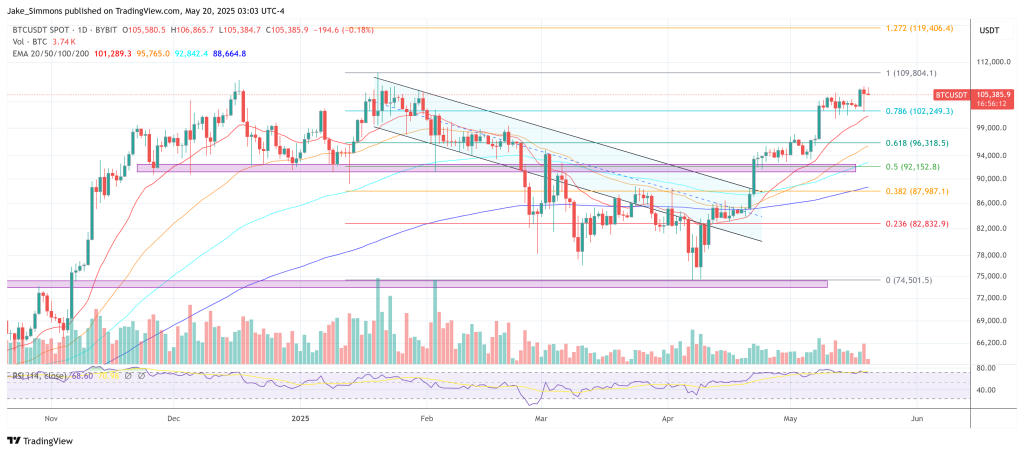Bitcoin’s environmental and macro-economic implications have vaulted the cryptocurrency from a niche policy matter into the thick of Chile’s presidential race, with advisers to every major contender treating the asset—and the mining industry that underpins it—as a potential vote-winner rather than a liability.
Bitcoin Emerges As A 2025 Election Issue In Chile
New Zealand-based ClimateTech venture capitalist Daniel Batten told his followers on X that “Bitcoin is shaping as an election issue for Chile in 2025.” He added that after meetings on both sides of the aisle, no serious candidate now opposes the technology, because “being against Bitcoin is like being against the Internet: political suicide.”
Behind Batten’s assessment stands a two-year, largely low-profile lobbying campaign led by Chilean software-engineer-turned-policy-advocate Andrés Villagrán. Since 2023 Villagrán has shepherded US strategist Dennis Porter, chief executive of the Satoshi Action Fund, through committee rooms in Santiago and regional capitals, pitching Bitcoin mining as an antidote to the country’s worsening renewable-energy curtailment problem. In a post on 18 May he reported “Great progress in Chile this week! Met w/ presidential candidates on Bitcoin & its role in clean energy/efficiency. Pushing for inclusion in programs.”
Villagrán’s talking points resonate with legislators drafting a Strategic Bitcoin Reserve (SBR) bill—legislation that would authorise the Central Bank to hold Bitcoin alongside gold and foreign currency. “In 2023 I embarked on an incredible journey… meeting over 20 parliamentarians and several ministers,” he wrote earlier this year, stressing that additional sessions with the Ministry of Finance are planned for the second half of the year.
Porter reinforced the message last week in a 40-minute keynote at the Chile Fintech Forum 2025, calling curtailment “a crisis” that wastes six terawatt-hours of solar and wind annually. “When you combine variable renewable generation with a variable load like Bitcoin mining, you can absolutely and completely eliminate curtailment,” he told the audience, arguing that miners’ ability to power down on demand makes them grid-stabilising rather than parasitic.
@Dennis_Porter_ en #ChileFintechForum2025: la minería de Bitcoin puede revolucionar nuestro sistema energético. Envía este video a los políticos y exige que prioricen esto. Llevamos bastante tiempo junto a Dennis informando a Ministerios, Diputados y Senadores de Bitcoin
pic.twitter.com/UStgKda93e
— Andrés Villagrán
(@avillagran) May 15, 2025
The political class has taken notice. According to campaign aides with knowledge of the briefings, both José Antonio Kast of the right-wing Republican Party and Evelyn Matthei of the centre-right Chile Vamos coalition—currently tied at 17% in the latest Cadem survey—now frame Bitcoin as a competitiveness issue rather than a speculative bubble. On the left, the Unity for Chile pact has slated a 29 June primary featuring Carolina Tohá, Gonzalo Winter, Jeannette Jara and Jaime Mulet, none of whom has ruled out Bitcoin-linked energy policy.
With opinion polling still volatile six months before the 16 November first round, campaign strategists say the debate could crystallise on 20 June, when the first nationally televised candidates’ forum is expected to devote a segment to energy pricing and digital assets. Villagrán confirms that at least one contender has already pledged on the record to raise Bitcoin mining that night.
Whether the SBR bill advances before the election remains uncertain; the Central Bank’s board has warned of “volatility and liquidity concerns” under IMF reserve-management rules, and President Gabriel Boric’s administration has maintained public neutrality. Yet the political cost–benefit has shifted. As Batten put it, Chilean politicians have “learnt from the Democrats’ debacle in the US” and are determined not to be caught on the wrong side of a technology that many voters now equate with innovation, cheap power and macro-hedging.
If that calculation holds, November’s ballot could mark the first time in Latin America that a major economy heads to the polls with every viable presidential programme containing a chapter on Bitcoin—an outcome that may matter as much to the global energy debate as to the future of digital money.
At press time, BTC traded at $105,385.

from Bitcoinist.com https://ift.tt/j8ESuq4

Comments
Post a Comment